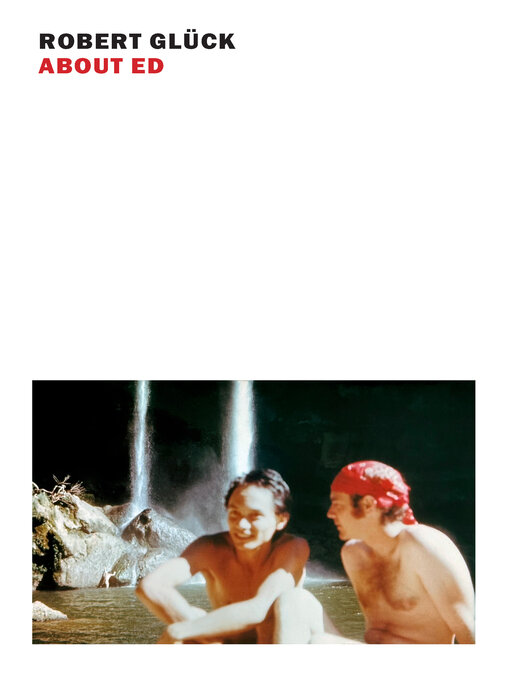Bob Glück met Ed Aulerich-Sugai in 1970. Ed was an aspiring artist; Bob wanted to write. They were young men in San Francisco at the high tide of sexual liberation and soon, and for eight years, they were lovers, after which they were friends. Ed was an explorer in the realms of sex. He was beautiful, fragile, exasperating, serious, unassuaged. In 1994 he died of HIV. His dream notebooks became a touchstone for this book, which Glück has been working on for some two decades, while also making his name as a proponent of New Narrative writing and as one of America’s most unusual, venturesome, and lyrical authors. About Ed is about Ed, who remains, as our dead do, both familiar and unknowable, faraway and close. It is about Bob too.
The book is a hybrid, at once fiction and fact, like memory, and it takes in many things through tales of political activism and domestic comedy and fury to questions of art and love and experiences of longing and horror. The book also shifts in register, from the delicate to the analytic, to funny and explicit and heartbroken. It begins in the San Francisco of the early 1980s, when Ed and Bob have been broken up for a while. aIds is spreading, but Ed has yet to receive his diagnosis. It follows him backward through his life with Bob in the 1970s and forward through the harrowing particulars of death. It holds on to him and explores his art. It ends in his dreams.
-
Creators
-
Publisher
-
Release date
November 14, 2023 -
Formats
-
Kindle Book
-
OverDrive Read
- ISBN: 9781681377773
-
EPUB ebook
- ISBN: 9781681377773
- File size: 484 KB
-
-
Languages
- English
-
Reviews
-
Kirkus
October 15, 2023
An autofiction elegy for both a former lover and the AIDS era. The Ed of the title is Ed Aulerich-Sugai, an acclaimed painter who died of AIDS in 1994. He and artist-essayist-poet Gl�ck were lovers in the early '70s, though this book doesn't strictly chronicle their relationship, breakup, and friendship. Instead, Gl�ck delivers lyric-essay chapters on his San Francisco neighbors as well as friends lost to AIDS through the '80s, bouncing between erotic remembrances of hookups to more mournful thoughts about Ed's death. Gl�ck's tone can be wryly comic in remembering this era: "There were not enough orgasms in the universe to cut through the knot of tension that was Ed." Or it can be gently lyrical: "Burning isolation. From each red window Ed's outstreached arms. I'm safe in heaven, somehow." And there's a genuine tenderness in some moments, as when he recalls washing Ed's body with another lover after his death. But there's no prevailing order to this jumble of remembrances, which makes it hard to find a throughline in either Ed's personality or his relationship with Robert--and makes a scene of coprophilia even more blindsiding than it'd usually be. Much of the closing sections are dedicated to Ed's dream journals, which deploy a variety of metaphors around sex and illness, including shape-shifting, war, and Dennis Cooper-ish visions of incest and pedophilia. Gl�ck's delivery here is abstract ("We run for our lives, dodging sunbeams filtered through a mesh of arching roses"), and anybody troubled by transgression is shopping in the wrong aisle. But it's as tedious to experience Ed's dreams at length as anybody's, and though Gl�ck plainly strives to be affirming and loving, the prose is more often exhausting. A sui generis but wearying examination of grief.COPYRIGHT(2023) Kirkus Reviews, ALL RIGHTS RESERVED.
-
Publisher's Weekly
Starred review from October 30, 2023
The masterly latest from Glück, whose novel Margery Kempe was reissued by NYRB Classics in 2020, examines sex, death, and literature through the story of his friend’s death from AIDS. “Reader, allow me to erect a monument inside you,” Glück begins. That monument is for Ed Aulerich-Sugai, an artist whom Glück met in San Francisco in 1970 when both men were in their 20s. The narrative charts their life as a couple through the 1970s, as well as their friendship through the 1980s and early 1990s as the gay community faces the AIDS epidemic. “Life can’t last forever but memory can,” Glück writes. “Mourning occurs in the empty wasteland between the crowded past and the crowded present.” The spine of the novel is the period between Ed’s HIV diagnosis in 1987 and his death in 1994, with the stages of physical and mental decline observed by Glück in intensely elegiac prose. Based on 20 years of notes, including recorded conversations with Aulerich-Sugai and excerpts from his dream journals, Glück’s novel is as philosophical and theory-leaning as one would expect from a writer of the New Narrative movement, while still offering carnivalesque carnality, piercing humor, keen social observation, and a humane, earthy sensibility. This is a revelation.
-
Formats
- Kindle Book
- OverDrive Read
- EPUB ebook
Languages
- English
Loading
Why is availability limited?
×Availability can change throughout the month based on the library's budget. You can still place a hold on the title, and your hold will be automatically filled as soon as the title is available again.
The Kindle Book format for this title is not supported on:
×Read-along ebook
×The OverDrive Read format of this ebook has professional narration that plays while you read in your browser. Learn more here.


